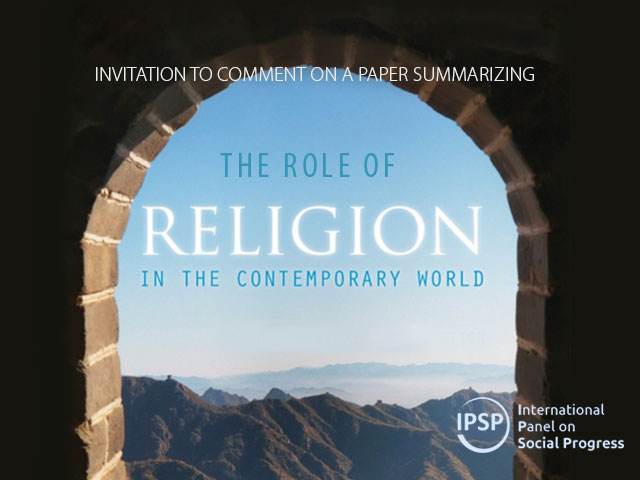Calling All Scholars of Religion: A (Free) Invitation to Comment on a Paper Summarizing the Role of Religion in the Contemporary World

About The Event
We would like to take this opportunity to introduce the International Panel on Social Progress (IPSP). You will see that it exists to:
- “Harness the competence of hundreds of experts about social issues” and to
- “Deliver a report addressed to all social actors, movements, organizations, politicians and decision-makers, in order to provide them with the best expertise on questions that bear on social change”.
We and our team have written the chapter on religion, entitled ‘Religions and social progress: Critical assessments and creative partnerships’.
Here is the Abstract:
- This chapter starts from the premise that some 80 percent of the world’s population affirms some kind of religious identification, a proportion that is growing rather than declining. Emphasizing the significance of belief and practice in everyday lives and local contexts, we analyze the impact of religion and its relevance to social progress in a wide variety of fields. These include the family, gender and sexuality; differences and diversity; democratic governance; violence and peace-making; health and economic well-being; and care for the earth.
- We argue that researchers and policy makers pursuing social progress will benefit from careful attention to the power of religious ideas to motivate, of religious practices to shape ways of life, of religious communities to mobilize and extend the reach of social change, and of religious leaders and symbols to legitimate calls to action. All of that, however, can be put to either good or ill, for which reason assessment of particular religions in specific contexts is essential.
Running through the chapter are five interconnected themes:
- The persistence of religion in the twenty-first century;
- The importance of context in discerning outcomes;
- The need for cultural competence relative to religion;
- The significance of religion in initiating change;
- And the benefits of well-judged partnerships.
The continuing need for critical but appreciative assessment and the demonstrable benefits of creative partnerships are our standout findings.
Find more information about the IPSP and its ways of working at: www.ipsp.org


We're always eager to hear from you.
If you’d like to learn more about us or have a general comments and suggestions about the site, email us at